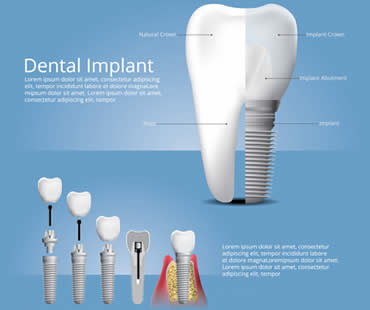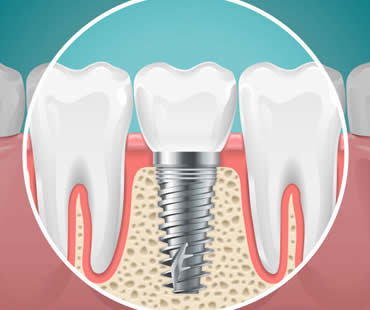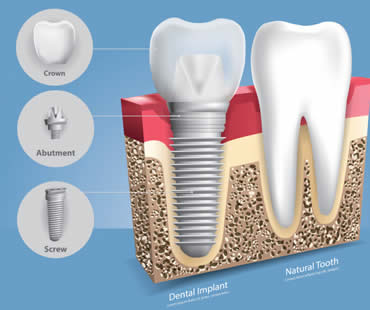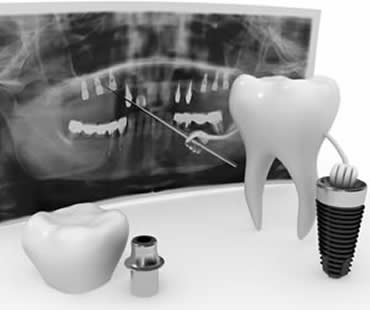
Dental implants have been in use for more than sixty years, and over that time period, they have risen in popularity among cosmetic dentists as the top-of-the-line tooth restoration for patients with missing teeth.
Dental implants have two main components: a screw-like base and a fabricated tooth-like replacement that sits on top of the screw. Typically the screw is made from titanium and is extremely durable. The screw is surgically implanted directly into the patient’s jawbone, and over time, it fuses directly into the bone. This process is known as osseointegration and it’s the reason dental implants are so successful.
This bond with the bone allows the implant to serve as a complete replacement for the roots of a missing tooth. Dental implants can be used to anchor a single tooth, a dental bridge or even serve as one of several secure implant anchors for dentures.
The bones of the jaw thrive through the stimulation of a tooth’s natural roots. Remove the roots and the bone begins to shrink. This is the reason dentures seem to shift over time. The denture is the same shape; it’s the bones that are changing. Because dental implants mimic tooth roots in the bone, the bone remains stimulated, and continues to be healthy, providing support for surrounding tooth roots and the patient’s facial bones.
Dental implants have a very high success rate. They look very much like natural teeth. They are stable and secure and are considered by many cosmetic dentists to be the best choice for replacing one or more missing teeth.
If you are missing a tooth and you want the best restoration available, talk to the cosmetic dentist in Longview about dental implants. You might be surprised to learn about all the benefits dental implants can offer you to replace your missing tooth.
Are dental issues holding you back? Take control of your oral health by booking an appointment with our experienced team at our Longview dental office.

If you have lost a tooth due to injury, disease, or decay, you may be wondering what your options are for restoration. The best, long-term solution for restoring your single missing tooth is a dental implant fitted with a crown. A single tooth dental implant replaces both the natural tooth, as well as the tooth’s root.
A dental implant allows you to replace a missing tooth without altering the state of surrounding teeth. Common alternative treatments, such as the placement of a tooth-supported bridge, require neighboring teeth to be filed or cut down into peg shapes to support the appliance. Those compromised teeth are more susceptible to decay and bone loss. However, dental implants do not require such alterations, thus preserving the healthy teeth. The placement of an implant involves placing a small titanium post into the jawbone, which provides an anchor for the placement of the implant. This artificial “root” attaches to the bone and gums to become a base for a crown.
You may be tempted to avoid restoring one missing tooth; however, leaving it untreated can result in bone loss, altered chewing capability, and an overall unappealing appearance to your smile. For these reasons, it would be wise to consider an individual dental implant to replace your single missing tooth. With proper oral hygiene and regular dental care, single tooth implants can last as long as 25 years. Schedule a consultation with your dental professional to determine if you are a good candidate for a single tooth dental implant to replace your missing tooth and restore your healthy smile.
Take the first step towards a confident smile. Contact our Longview dental office to schedule your consultation!

Dental implants are an option for people who have lost a tooth or teeth due to decay or damage. With implants, an artificial tooth root is placed into your jawbone to provide support for crowns and dentures. When considering implant treatment, you may have some of the following questions and concerns:
- Who is a candidate for dental implants? Implants can be placed in almost anyone after adolescence or when bone growth has completed.
- Is implant surgery painful? No, implant treatment is usually performed under local anesthesia in your dentist’s office.
- How long does it take to place dental implants? Depending on the number of implants placed, the procedure can usually be completed in less than an hour.
- What kind of recovery can I expect after a dental implant procedure? Healing from implant surgery is usually quick and uneventful. Any pain or discomfort should be minimal and easily controlled with anti-inflammatory medication. Most patients can return to normal activity the next day.
- How long will it take before I receive my new teeth? Because the implants need time to fuse to the bone, the entire process can take up to six months. Typically, you will receive some form of temporary teeth during this period. Treatment time varies depending on your treatment needs.
- Is caring for my implants difficult? Caring for your dental implants is the same as caring for your natural teeth. Implants simply require consistent brushing and flossing and regular dental visits for routine cleanings.
- How long will my implants last? When cared for properly, dental implants should last for decades.
- Are dental implants safe? When used in qualified candidates, dental implants are an exceptionally low-risk restoration option.
In general, dental implants have a success rate of up to 98%. With proper care, implants can last a lifetime.
Are dental issues holding you back? Take control of your oral health by booking an appointment with our experienced team at our Longview dental office.

If you have lost one or more teeth due to decay, disease or damage, you may be wondering what your options are for restoration. While there are several choices available to replace missing teeth, dental implants are considered the most innovative and advanced treatment option offered in dentistry today. A dental implant is a fabricated tooth root placed in the jawbone to secure a replacement tooth or bridge. With vigilant oral care, dental implants are highly successful and can last for a lifetime.
Dental implants are known to most closely act like your natural teeth. Their feel, function and appearance resemble that of a natural tooth. Unlike dentures, dental implants do not require special glues or adhesives. Implants are cared for exactly like your natural teeth, only requiring you to brush and floss normally and maintain regular dental checkups and cleanings.
Another benefit of dental implants is their ability to preserve your natural facial structure by preventing and slowing the bone resorption caused by tooth loss. Traditional dentures do not offer this advantage.
Patients who choose traditional dentures to replace missing teeth may also find they have trouble eating or speaking due to ill-fitting or slipping appliances. Because they function like natural teeth, with dental implants you will enjoy all your favorite foods and never have to worry about your dental appliance shifting or clicking.
Consult with your dentist to find out more about how dental implants can provide you with a lifelong solution to your missing teeth. Your dentist will assess your specific needs and determine if you are a good candidate for implants, so you can get back to enjoying life with a full set of healthy teeth.
Take the first step towards a confident smile. Contact our Longview dental office to schedule your consultation!

Restoring a missing tooth is not as unnatural as you might think with the help of dental implants. These restorations have transformed the ability of dentists to make your smile complete and fully functional without the worries of cumbersome dentures or bridges.
Dental implants involve surgically placing a titanium rod into the jaw bone, which will then fuse with the bone to become a part of your body. A trusted, experienced dentist or oral surgeon is the best professional for this procedure. The implant provides a stable and secure base for a replacement tooth which is later placed on top of the rod.
Most people with missing teeth are candidates for dental implants, although your dentist will perform an examination to make sure. Healthy gums and ample strong bones are required for a successful dental implant treatment.
There are two main types of dental implants. Subperiosteal is designed for patients with a shallow jaw bone that does not allow for rebuilding, so these implants are placed under the gums. Endosteal is for patients with a thick jaw bone, which is ideal for the implant being placed into the jaw bone using plates, screws and cylinders for support. Your dentist will advise which type of implants are best for you.
Once the implant surgery is performed, the area will be allowed to heal for up to a couple of months so that the artificial tooth or crown placed on top will be able to successfully complete the procedure. Once the entire treatment is finished, you’ll have a fully functional, comfortable and secure new tooth and root.
No special maintenance is required with dental implants. Normal brushing and flossing is recommended, as well as regular dental checkups to guarantee good oral health. Implants are made to last a lifetime with proper oral care. With this advanced treatment that dentistry offers today, you can expect a worry-free restoration that gives you back your smile.
Do not let another day go by without taking care of your dental needs. Request an appointment now at our Longview dental office!

Dental implants are the state-of-the-art restorative solution for missing teeth. They provide a stable base that is the next best thing to a natural tooth root. Because of this and other qualities, dental implants are rising in popularity each year as more and more people discover their convenience and stability.
Dental implants are replacement teeth, typically made of porcelain or a similar material, mounted on top of a titanium screw that is embedded into a patient’s jawbone. Over time, this screw will fuse directly with the bone in a process known as ossification. This fusion creates a tooth base that is so stable, it’s as good as a tooth’s natural roots.
Dental bridges can become dislodged and food may collect under the bridge, leading to discomfort and bacteria build-up. A dental implant goes all the way down, so there’s no “under” underneath to collect food and cause problems.
Most tooth restorations necessitate special ways of cleaning or flossing, and you have to be careful you’re doing all the right things to maintain your teeth properly. You care for a dental implant the same way you do for a natural tooth, by brushing and flossing, so you don’t even have to think about it when you’re cleaning your mouth.
The bones in your jaw are only healthy as long as you have healthy tooth roots in them. The tooth roots stimulate the bone, signaling it to stay full and healthy. Without the stimulation of the roots, the bone begins to shrink away. Dental implants preserve bone by acting as artificial tooth roots. The jawbone can’t tell the difference, and the bone stays strong and robust.
These factors and more are leading patients to turn to dental implants to address their missing teeth. Talk to your cosmetic dentist to see why dental implants are the perfect choice for you.
Do not wait any longer. Book your appointment now and achieve the smile you have always wanted. Dr. DiStefano is accepting new patients from Longview and the surrounding area.









